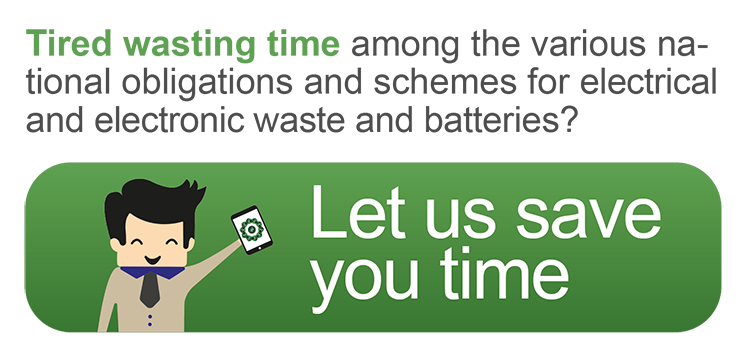Producers of Electrical and Electronic Equipment have to analyze, understand and adapt to the requirements from the environmental legal framework, while their business interest is to ensure growth and performance.
WEEE Compliance is a legal prerequisite for doing business, however it means a lot more than just a stamp on a piece of paper. It is about administrative paperwork, contracting, data sharing into national organizations, cross functional involvement, take back, recycling and business model evolution.
By the way, compliance setup is the top of the iceberg. Then comes the take back and recycling services to be offered to clients, as well as information and promotion of take back services, ecodesign of devices, etc.
This article suggests 6 actions to better coordinate and engage its organization in a compliant and fruitful development.
1 : Identify obligations and define compliance needs properly
Companies that sell Electrical and Electronic Equipment shall make sure their devices are compliant with a variety of legal requirements (product safety, CE marking, energy consumption, etc.).
WEEE compliance requests them to be registered and to finance take back and recycling solutions according to their national obligations. Furthermore, it requires them to provide dismantling manuals per device, to mark devices with the crossed-out wheely bin, and to engage in the ecodesign of devices.
The identification of obligations is an important first step and can be supported by environmental experts or lawyers. This will draw the legal requirements per market presence and will determine whether a company has WEEE obligations or not, according to sales routes and channels, involvement of business partners, invoicing mechanism etc.
This complexity shows why it is helpful to get assistance from a compliance hub or a law firm eventually. Moreover, it is also possible to simplify market access and to differentiate from competitors by setting compliance voluntarily in order to avoid business partners to be responsible for it.
2 : Inform colleagues and management about the necessary compliance activities
Share information with your colleagues from sales and marketing teams, the financial department, technical divisions, and of course the general management.
At some point they are all concerned by compliance aspects:
-
Market differentiator
-
Added value services
-
Costs reductions and budget provisions
Financial teams look for optimizations and cost reductions, procurement and purchasing seek economies. It is nowadays possible to reduce waste management costs by contracting with compliant suppliers that endorse the WEEE responsibility.
Indeed, the company can reduce its waste management costs. Finally, companies willing to set compliance shall anticipate total costs of compliance including future development of costs. This should take into account the internal manpower required to manage all required activities. Financial teams are willing to prepare their budget accordingly in order to avoid unplanned spendings.
-
Secure management’s commitment about Environmental compliance
Compliance is the final responsibility of the general management of each obligated entity in a country. A compliance briefing shall be presented and explained to general management so that they support compliance activities and are able to avoid risks.
3 : Promote WEEE compliance activities in countries
Compliant companies can illustrate their compliance activities and communicate this to media, key accounts, and the public.
One can i.e. publish environmental reports as well as edit dedicated web pages so that potential clients and followers can access information and identify it as an environmentally friendly company.
Such communication can be oriented towards different audiences:
- Professionnal purchasers: demonstration of compliance and related take back services available
- Consumers : take back, reuse and/or recycling solutions
- Business partners (distributors, resellers etc.): proof of compliance such as a national WEEE registration number or a list of national compliance schemes contracted
- Marketing campaigns and business development actions: integrate key compliance assets in sales documentations to demonstrate the company’s intention and market differentiators from take back and recycling services available
4 : Develop strategies for circular economy programs
Linear business models shall evolve, especially within the electronics industry. The use of expensive or rare materials forces the industry to rethink strategies and adapt to new paradigms. Therefore, authorities develop new stringent legal frameworks to reduce the proportion of mining and foster recycling.
Manufacturers and decision makers can then influence the design of new devices by integrating secondary raw materials, recycled materials, and alternative materials to replace hazardous substances, pollutants etc.
Plastic is also at stakes nowadays. Brominated flame retardants have put plastic producers under strong pressure since it becomes more and more difficult to give a second life to plastics containing brominated flame retardants.
Companies shall develop alternatives and conduct change within their organisation, their sourcing concepts and product design to ensure compliance in the near future.
The legal framework steadily introduces requests for minimum quantities of recycled materials to be used in new products.
The production of cleaner and greener devices will lead to a circular business model. In this model products will be conceived - thanks to a long standing perspective - either in a collective, open loop business model where materials from products are recycled into other types of equipment, OR an individual/vertical, closed loop business model where companies collect their own products/brands in order to repair, refurbish or remanufacture them into new devices.
The change needs to be organised. Collective open loop or vertical individual loop will drive to similar results in terms of reduction or dissemination of hazardous substances.
5 : Offer replacement and collection service & Organize internal purchasing by selecting only WEEE and battery compliant suppliers.
(purchase new compliant EEE and get rid of your old equivalent devices for free)
Compliant producers shall set and manage compliance. Among a variety of obligations, they shall ensure in each country where they sell devices, that they will also provide free take back and recycling services at their clients’ sites (notably for professional equipment, with the support of municipalities and retailers for consumer goods). This free service shall be offered when clients purchase new devices that replace old equivalent equipment.
A company that tenders for replacing its old air conditioning equipment (or desktops, laptops, smartphones and cellphones, heaters…) can legally requets that the supplier of the new equipment will take back and recycle for free the old air conditioning, no matter the brand owner.
The key advantage is that the buyer does not have to take care of waste disposal or waste management. He reduces the cost for managing waste and transfers the responsibility to the supplier. One of the key output of the Extended Producer Responsibility (EPR) principle.
6 : Set new partnerships for pending environmental challenges
The combination of legal requirements, compliance obligations, organizational consequences, compliance costs, and data sharing is at stake.
In order to achieve changes and fulfil obligations, companies should anticipate and plan beyond the current technical brief.
Therefore, it is important to seek for new business partnerships or support that can :
- set compliance easily with the support of new technologies to offer a new and innovative compliance journey and increase transparency,
- facilitate differentiation by naturally integrating compliance and recycling in marketing programs,
- avoid product cannibalism by cumulating the latest new products launch with the take back of old equipment,
- develop surrounding services such as warranty, spare parts management, and after sales services
- investigate secondary raw materials for the design of new devices.

WEEElogic belongs to a group of companies specialized in compliance management, take back and recycling, marketing integrated services, and circular economy solutions.
Therefore WEEElogic can support companies with their compliance or environmental evolutions, including material sourcing, compliance setup and coordination, data reporting, take back and reverse logistics, transboundary shipments, recycling, refurbishment and marketing services.
Romain Letenneur


